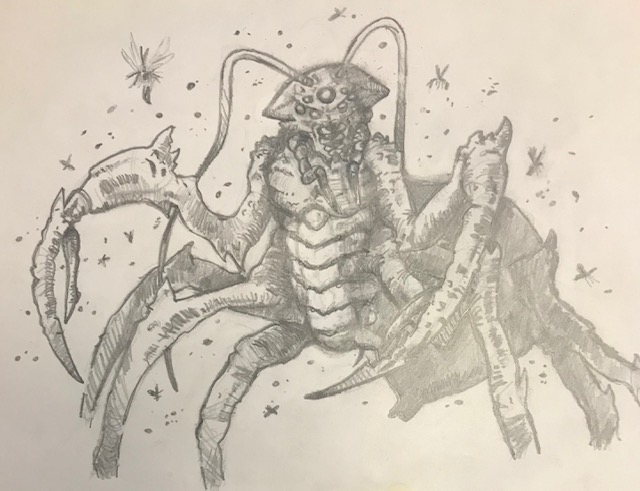You could make a similar argument about why various sorcerer-monarchs don’t invade Saragar, or move to the forest ridge, or pick up shop and go invade 5th Age Dragonlance. All of those would be greener pastures than the Tablelands. Or why not have the Order curb stomp the sorcerer-monarchs. Or any number of things.
I LIKE secrets of the dead lands. I’m not going to apologize for that. It’s an example of some of the crazy gonzo stuff TSR was putting out in its death throes, yes. It’s rough around the edges, yes. Some of it has issues that people can legitimately criticize, yes. That doesn’t mean it’s a steaming pile of crap, nor that it was director-less (direction-less? Timothy Brown,Doug Stewart, and Harold Johnson all worked on it, and Bill Slavicsek and Bruce Nesmith both had input).
People criticize the dead not leaving the basin. Ok, I get it. But I still feel there are legitimate reasons they stay down there. Two people with opposing views on a thing can still have legitimate critiques and points about the same thing. Surprise.
My acceptance of them mostly staying there is based on the following:
-
Rajaat’s followers were explicitly stated to have willingly subjected themselves to psychology-altering magic and drugs that stunted/destroyed their capacity for free-ranging thought. They were made to remain singularly focused on a task at hand, to the exclusion of all else. This effect was so strong it spanned GENERATIONS.
-
Undead in general under 2e are static and generally unchanging in behavior, locked into loops and incapable of growing beyond what they were at the time of death / undeath. There are exceptions like Dregoth and Vecna, but they’re also exceptional in a lot of other ways, too.
-
Those who die near the gate become undead. The obsidian plane (not plain, I mean the literal extraplanar source of the basin’s obsidian flow) is stated to have a weird relationship to reality that blurs the states of life and death and is apparently the source of the zhen. Because of this, there is an explicitly stated link between the undead (or at least certain members of the ruling class that directs the various factions) and the obsidian.
-
The text explicitly states “From their point of view, the Cataclysm that created their tomb must have been all encompassing, choking the life out of the world completely, leaving them as the sole masters of what remained of Athas.” Qwith is stated to have uneasy thoughts about the sand dunes that border her land. When they all died, the basin wasn’t surrounded by a desert. If there were still life out there, surely someone (like all-powerful Rajaat, or one of his agents) would have checked on the basin. Right? Except the only living things anyone in the basin has encountered (generally, for the most part) have been giant insects. And when you raise them to unlike you get bugdead. So for all anyone knows, except the basin, the entire planet is now dead and infested with potential bugdead. Which everyone is afraid of to the point of drafting and (generally) adhering to a kind of mini UN defense pact against bugdead.
Those points combined spell out to me that the undead (generally) have no reason to believe anything survived, and their psychological damage/conditioning combine with their undead state to reinforce that idea and keep them in the area that was their genesis.
That being said, there isn’t actually anything keeping them from leaving the basin. There’s the one slave’s account of undead slaughtering her expedition, and the whole point of the Emissary is that, should the PCs fail, in two years a massive army of undead will swarm north. That whole can of worms just reinforces the whole idea that the undead staying away from the Tablelands is a combination of psychology and lack of information. That’s not a plot hole. It’s a plot point.
Now. If I were going to do things a little differently . . .
I would explicitly have a section addresses this that definitively explains the whole situation. "So why haven’t the undead lords attacked the Tablelands? Why do they expend so much effort mining new corpses and recycling the ones they have, instead of attacking relatively defenseless Celik or living creatures to the north? Because psycho-magical alterations and returning to “life” in a world unlike the one they remember, having the belief that the entire world is now dead.
Actually, wait. It does EXACTLY THAT.
Except it’s almost treated like a throwaway line, and (in my opinion) not enough attention is called to it. Apparently? Because now people are acting like it’s a big mystery?
Something else I’d do is more fully explain/address the genesis of the zhen. If a bunch of people die and come back to life and the word “zhen” is imprinted in their mind, that has to mean something, right? Except it never goes into it.
